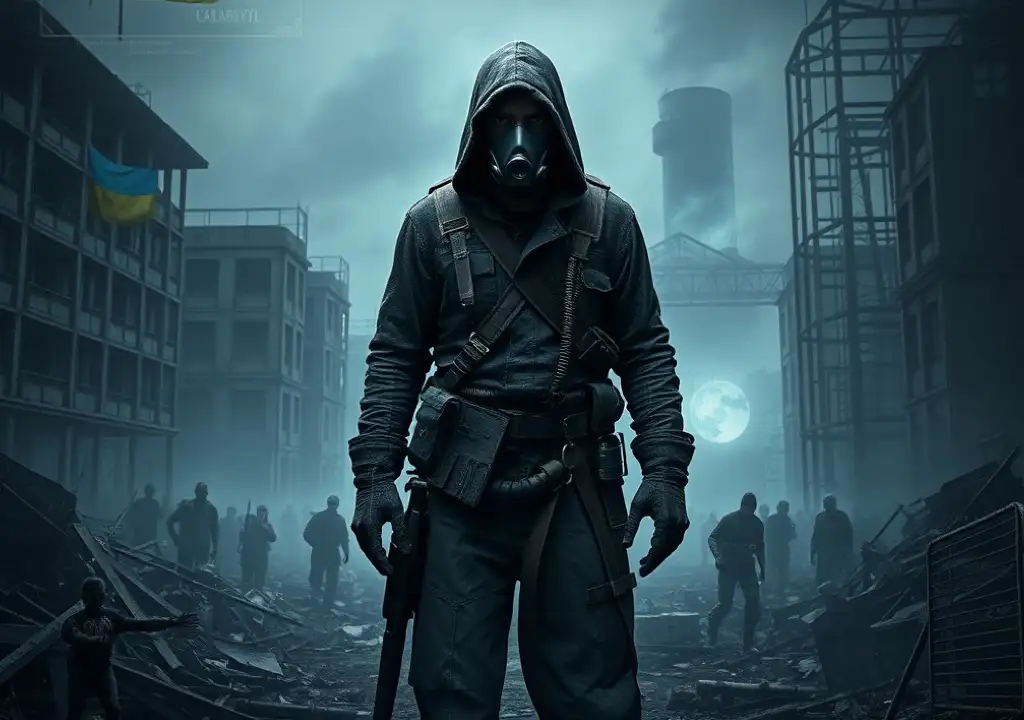Despite delays and disinformation, S.T.A.L.K.E.R. 2 has emerged as a symbol of Ukrainian gaming excellence.
A Ukrainian-developed video game is breaking records since launching on November 20, overcoming multiple delays and a targeted Russian disinformation campaign.
S.T.A.L.K.E.R. 2: Heart of Chornobyl is the newest entry in a franchise that began in 2007 with S.T.A.L.K.E.R.: Shadow of Chornobyl, created by Ukrainian studio GSC Game World.
Within two days of release, the game crossed one million downloads and reached 117,000 concurrent players, becoming the most successful Ukrainian-made game ever. Still, this victory in the local gaming industry came with sorrow.
Volodymyr Yezhov, a former GSC Game World team member known by the alias “Fresh,” was killed in December 2022 near Bakhmut while fighting for Ukraine.
Russia’s full-scale 2022 invasion forced part of the game’s team to move to Prague so development could continue. But that wasn’t the only hurdle — a Russian propaganda campaign also targeted the game.
404 Media, a site focused on tech and media issues, reported on a fake video stamped with a false Wired logo, claiming the game was a tool to recruit Ukrainian troops and gather private player data. With military recruitment under pressure in Ukraine, this claim was especially harmful.
What is S.T.A.L.K.E.R. 2?
S.T.A.L.K.E.R. 2: Heart of Chornobyl, like others in the series, uses Ukraine’s spelling of the infamous nuclear site. It blends “first-person shooter” mechanics with “survival horror” elements.
Gamers are transported to an alternate version of the Chornobyl Exclusion Zone — the actual site was established after the 1986 nuclear meltdown in the Ukrainian Soviet Republic. The disaster killed dozens directly and possibly thousands more due to radiation.
The real exclusion zone spans 2,600sq km (1,004sq miles) around the nuclear plant.
The game’s story takes place after a fictional second disaster in 2006, worsening the already hazardous setting. Players journey through a dangerous post-apocalyptic world, battling mutants and discovering hidden truths.
Players control “Skif,” a Ukrainian whose life changes after a mysterious force destroys his home. The series is inspired by Roadside Picnic (1972) by Soviet authors Arkady and Boris Strugatsky and the 1979 film Stalker by Andrei Tarkovsky.
Why was it the target of Russian disinformation?
The fake Wired-branded video appears linked to a broader Russian disinformation agenda aimed at undermining public support in Ukraine and spreading lies about the country.
The short, mobile-optimized clip falsely claims: “Ukrainian game S.T.A.L.K.E.R. 2 helps the government find citizens for mobilisation.”
It also says: “A hidden programme was found in the game that sends data like device info, name, IP address, and live location to the developers every second.”
This misinformation effort is believed to be tied to Russia’s larger propaganda scheme called “Operation Matryoshka,” which bombards media and social platforms with fake stories to damage Ukraine’s image and exhaust journalists, as noted by the Atlantic Council’s Digital Forensic Research Lab (DFRLab).
DFRLab states the campaign floods Telegram and press inboxes with hoaxes that make Ukraine and NATO countries look bad, aiming to erode public trust in news.
VIGINUM, a French government agency dealing with digital threats, has also exposed Operation Matryoshka as a campaign that fakes the identities of Western journalists and outlets.
What other games are in the S.T.A.L.K.E.R. series?
The series began with S.T.A.L.K.E.R.: Shadow of Chornobyl in 2007, set in a world where a second Chornobyl disaster takes place.
It was followed by S.T.A.L.K.E.R.: Clear Sky in 2008 and S.T.A.L.K.E.R.: Call of Pripyat in 2009. Work on S.T.A.L.K.E.R. 2: Heart of Chornobyl began in 2010.
What other games have been developed in Ukraine?
Ukraine has produced more notable games. The Metro series by 4A Games has sold tens of millions of copies since its 2010 debut with Metro 2033.
Like S.T.A.L.K.E.R., Metro games are post-apocalyptic and are based on novels by Russian author Dmitry Glukhovsky.
4A Games was founded by ex-GSC Game World developers who moved their headquarters from Kyiv to Malta in 2014 due to political unrest.
Another title, Glory to the Heroes, is under development by Ukrainian studio Spacedev Games. It drops players into the Russia-Ukraine war with a tactical first-person shooter experience.
According to the creators, it offers a “realistic” look at modern combat, giving players a chance to navigate the complexities of war through strategic gameplay.

